- Home
- Courtney Milan
Her Every Wish Page 5
Her Every Wish Read online
Page 5
She gave him a baleful glare.
“So,” he said. “Feet on the pedals. Push first on the top one. No, not to the side—down, smoothly down. Like that. Now the next.”
It took her a few revolutions to get the gist of the motion. She went slowly; he paced beside her. They started along the canal at a snail’s pace. He kept one hand on the seat, the other on her spine, steadying her as she moved.
“A little faster,” he told her. “I can keep up.”
A little faster meant there was a bit of wind as they moved. The breeze whipped her bonnet off her head and left it trailing behind her, held in place only by bonnet strings. It stole little tendrils of pale hair from Daisy’s braid. A little faster meant that his hand was no longer steady against her spine. His palm jogged with his pace, up and down, up and down.
The cold lent color to her cheeks. Her determination gave fire to her eyes. God, he missed Daisy.
It wasn’t the first time he had missed her.
It happened at odd intervals. When he heard an amusing story and thought of telling her. When he had an idea he wanted to share with her. When he saw her on the street and accidentally smiled before he remembered.
He didn’t really miss her. He missed the woman he’d once believed she was.
But he missed that woman now, almost intensely. He missed the way she gritted her teeth as she concentrated. He missed the way she kept trying, no matter what life threw at her. The way she gripped the handlebar, as if holding on more tightly would save her from a fall.
He missed the way she’d once trusted him, the way she had used to look at him.
“See?” he told her through even breaths as he ran alongside her. “Keep going. You’re still very high up, but you’re less wobbly, aren’t you?”
Her teeth gritted. “Maybe.”
“You can go faster.”
“But if I do?”
“I’ll be right here,” he lied.
She went faster.
It wasn’t hard to get to the point where he couldn’t keep pace with her on the velocipede. She had her gaze trained ahead; she didn’t even notice when it happened. He let go and she kept on pedaling. For one moment, then two. Her grip relaxed. Her teeth stopped gritting together.
Her expression began to shade into exhilarating wonder.
It lasted for precisely one second. Then she realized that he was no longer supporting her. She looked around, jerked the handlebar—
Crash winced as she toppled to the ground. He jogged up to where she lay on the path, a tangle of skirts and pedals and indignation.
She pushed herself up on her hands, brushing gravel away. “You said you’d hold me up!”
“I lied,” he said succinctly.
She unraveled her scarf from the mess on the ground and unwound her skirts from the pedal where they’d tangled. “I ought to have known.”
“It was worth it,” he said. “You had the feel of the velocipede for one second. For one second, you understood. All you have to do is go fast enough, and you don’t wobble. You fell because you stopped. Not because of me. That’s how it works. Don’t stop. Don’t question. Go faster.”
She brushed debris from her skirts and stood. “What has any of this to do with Daisy’s Emporium?”
“You let fear stop you,” he told her. “You stood up in front of the crowd and lost your nerve. I know you, Daisy.” And he did, a little. “Your figures are no doubt sound. Your plan is well thought through. You’ve likely researched every last item you want to sell in your shop. You know how much you can purchase it for in quantity and how much it will sell for. None of that matters, because nobody will ever know how good you are if you lose your nerve. That’s what you need to work on, Daisy. Not your speech, not your facts. Your nerve. You will be high up in front of everyone with no support, and when you get scared, you can’t falter. You need to go faster.”
“You…” Her jaw squared and she looked at him with suspicious eyes. “You think my plan is well thought through?”
“I’m not going to repeat myself.”
One of the things he’d once loved about Daisy was this. She looked down at her skirts, now decorated with a liberal smear of muddy snow down the side. She shook gravel from her gloves. Her jaw squared and she lifted her chin.
“Very well. I’m getting back on.”
It took Daisy an hour to achieve the minimum skill she needed to pedal down the footpath. An hour of wobbling and catching herself. An hour during which she fell twice. Her gloves tore. Her gown ripped. Daisy gritted her teeth and kept going.
An hour of Crash watching her, his heart aching for what they had almost been to each other. It was an hour until he steadied the velocipede against the bench one final time. Until he took her hand to keep her from falling as she dismounted and almost didn’t want to let go.
“Tomorrow?” he asked. “You need more practice.”
She shook her head. “The next day. I need… I need…” She didn’t say what she needed. She stood on the bench she’d used to disembark and looked down at him with wide, hurt eyes.
“Why?” she asked finally. “Why are you really doing this?”
Of course she knew it wasn’t about the damned wagers. If she’d talked to anyone at all about him, she had to know he’d refused to take any bets about the charity bequest at all.
“Because.” His voice came out a growl. “Because I want you to understand for once. I don’t get to stand still—if I did, I would fall. Unlike you, I never had a choice. If I start to wobble, I have to go faster.”
She flinched. “I said I was sorry.”
“I recall that you said you forgave me.” At length. That unwished-for absolution still rankled.
“And that’s why you’re still angry? I’ve seen you brush off harsher insults a thousand times.”
He held up a hand. “No. That’s where and why this ends. Tell yourself I could have lived differently all you wish. I can’t stop you; you are remarkably good at lying to yourself.”
She stared at him.
“I am good at going fast,” Crash said. “So good that sometimes all anyone sees is a blur. Insult me all you like. Deep down, though, you know better. You know who I am.”
Her eyes glittered back at him. “I know you very well, Crash. Everyone knows. You make a point of it.”
The things everyone knew about him… He held up a hand. “No. That’s where and how this ends. Tell yourself I could have lived differently all you wish. I can’t stop you; you are remarkably good at lying to yourself.”
She stared at him.
His teeth ground together. “But don’t lie about me when I’m standing right here. I don’t need your holy dispensation to exist.”
“Just as well,” Daisy shot back. “You don’t have it.”
Daisy unwound her scarf and set her ruined gloves in a wad on the entry table. Her body ached from the exertion and from the falls. She’d be sore the next day.
How fitting. Crash had a tendency to leave her sore in the morning.
The single room that she shared with her mother was still warm, a good sign. She always had to tell her mother to burn coal and never mind the cost. Winter was hard on her, and heat was one of the few things that kept her mother’s pains away.
Today, her mother had actually listened.
“Mother?” Their flat was a scant two rooms—one, really, but they’d rigged a curtain. Somehow, two tiny rooms seemed more luxurious than one small one. She peered around the fabric into the alcove where their shared bed stood. “Mother?”
She could smell something delicious—crisp jacket potatoes and something savory that might have been fish. But there was no answer.
Good. Her mother wasn’t here. Daisy found a rag and scrubbed at the mud on her skirt. The hem needed repairing, but it could be fixed. For now, a pin or two would manage.
She’d hastily tacked the fabric in place when the door opened behind her. Daisy turned guiltily. “Oh, Mama. There you are
.”
Her mother removed her own scarf and gave Daisy a bright smile. “I’m feeling better today. I was thinking that perhaps I’d take on a little more lacework instead of just the two pieces a week we agreed upon.”
It was always a delicate balance. The more her mother earned, the easier it was to purchase coal. The more her mother worked, the worse her rheumatism became.
“Mama.” Daisy stood and set her hand on her mother’s shoulder. “The last time you tried, your rheumatism had you laid up for weeks. It’s not worth it.”
Rheumatism. That’s what they assumed it was. Years ago, they had spent money they didn’t have for a physician. When he’d come, he’d examined her mother for a cursory three minutes. Then he’d pulled Daisy aside.
“There is nothing wrong with your mother,” he had told her in a quiet voice. “Women of her age don’t get rheumatism. She is malingering. She wishes to stay in bed, and so she’s invented aches and pains to do so. She doesn’t need compassion or medical treatment. She needs someone to insist that she work.”
Daisy had wanted to slap the man’s supercilious expression off his face. Instead, she’d paid his fee. So much for physicians, then.
“I have supper ready,” her mother said, “and I cleaned up a little—it does look nice, doesn’t it?”
“It does.”
“Sit,” her mother said. “Eat.”
They sat.
“Tell me about your day.”
Daisy looked over at her mother. Her hair was beginning to go white in wisps. Daisy still thought her pretty. She had a lovely smile. But speak of unrealistic wishes. Here was one. A single woman could hardly support an aging mother on her own.
Daisy knew it. The doctor had known it. Her mother knew it. Her friends tried to hint at it, to tell Daisy that she should—gently—do her best to disentangle herself.
Daisy held on through sheer stubbornness. They would make do as long as Daisy had good work. As long as neither of them got sick. As long as nothing bad ever happened, she could manage it all.
She couldn’t think of her mother, and her mother’s future, without feeling a little ill.
She didn’t want to talk about her day. She considered all her possible responses.
“I did some research,” Daisy said instead.
“What sort of research?”
“Research into the sorts of new businesses that are opening shortly.” Daisy frowned and speared a bite of potato.
“Oh? Anything interesting?”
Daisy considered the white lump on her fork. “There’s a shop that is selling…um. Velocipedes.”
“Whatever is a velocipede?”
“It’s…” How to even describe the thing? “A metal frame. With wheels. Difficult to describe.” She trailed off, mid-twirl of her fork, and looked at her mother’s pursed lips.
“That’s a thing that people would purchase? Why?”
Now that she’d ridden one, she could understand. There had been a moment of exhilaration. A sense that she could fly.
Daisy shrugged. “It’s not much stupider than, say, a carbolic smoke ball.”
“A what?”
“Another thing.” She frowned. “For invalids. It’s supposed to prevent influenza.”
“Fools and their money.” Her mother sighed. “Fools and their money. Drat it, why don’t we know more fools?”
Daisy smiled. “I shall have to expand the circle of our acquaintance.”
Her mother turned and contemplated Daisy. “You know, Daisy, it’s probably time that you start looking for a fool.”
Her heart sank. “You mean so that I can sell him a carbolic smoke ball?”
Her mother reached out and touched her hand. “To marry.”
Daisy looked away. She felt raw. Unready for this conversation.
“Youth won’t last forever,” her mother said. Her fingers tightened on Daisy’s hand. “I know you’re telling yourself that you have time…”
Daisy’s fingers lay quiescent under her mother’s while her stomach churned. You are remarkably good at lying to yourself. Crash was wrong; she knew perfectly well how things were.
“You have to take care of yourself,” her mother was saying. “Establish yourself. Have you seen a girl working in a flower shop above the age of thirty?”
Daisy shook her head.
“There’s a reason for that.” Her mother’s grip tightened subtly on Daisy’s hand. “It’s like those flowers you sell. Nobody wants them after they’ve begun to wilt. I know I sound terribly mercenary, but Daisy, dear, you don’t have to love him. You just have to be able to pretend well enough.”
Here was the thing: Daisy wouldn’t be marrying for herself, and her mother knew it. On her own, she might support herself indefinitely.
The person she could not support was her mother. Her emporium was a dream. No, worse; a distraction. It was a plaything she held up to pretend her future might be different than it was.
But this was the stark reality she faced. She needed to find a fool who wouldn’t mind—or notice—her lack of virginity. If she didn’t, one day she would have to walk away from the woman who had raised her because she could no longer afford her care.
It didn’t matter how little Daisy wanted that to happen. It didn’t matter how sick she felt at the thought. Coins didn’t lie.
Daisy could only hope she hadn’t ruined her chances at marriage. If she couldn’t marry, if nobody ever wanted her…
She couldn’t think of that.
She had to think of that.
Crash was right. Daisy was remarkably good at lying to herself. One day, she’d stop hoping to come to her own rescue. One day, she’d recognize that there was no escape. She’d do her best to find herself a fool of a fiancé, because she knew she wouldn’t leave her mother. She couldn’t.
When that happened, when she smiled at some man with half her sense, Crash would think the worst of her. He’d call her a liar and a cheat and more. He wouldn’t be wrong.
There were some things one could not say to one’s mother.
I cannot marry yet. There’s this man I hate—incidentally, the one who took my virginity—and he would poke fun at me.
No, it was time to grow up and face the truth. She couldn’t care what Crash would say.
She smiled at her mother instead. “I know.” Her cheeks hurt, holding that false expression.
Today was Monday evening. On Saturday, the judges would award the bequest to someone else. They would crush her dream. They’d make it clear that she’d told herself lies. At that point, she would have to accept what she had to do. She would have to stop hoping for an escape.
It was as inevitable as her mother’s rheumatism.
“Sunday,” Daisy said. “This Sunday. That’s when I’ll start looking.”
Chapter Five
Daisy was glad for work early the next morning, even though she woke with every muscle in her body shrieking in protest at their ill-usage the day before. Work gave her an excuse to wash quickly and hide the bruise on her hip before her mother noticed. Work allowed her to leave before the sun rose.
She didn’t have to think of her presentation or what would come after she lost. She arrived at the shop in the early morning hours and lost herself in her work, bunching together little bouquets of forced violets and tying them with ribbon. It was quiet work, comforting work; she didn’t have to talk to anyone while she was doing it. She could just match flowers together and tie them with cord. White and purple; pink and lilac. Each little bouquet was a bit of happiness that she put together for someone else.
Today, though, she couldn’t entirely lose herself in the activity. Her mother’s words came back to her.
It’s like those flowers you sell. Nobody wants them after they’ve begun to wilt.
Bouquets of temporary happiness. Purchased for a penny; discarded the moment they became inconvenient.
She could almost imagine Crash leaning close to her and whispering in her ear. You a
re remarkably good at lying to yourself.
She shoved her mental image of him away.
At least she enjoyed her work. She made people happy. She made them smile.
The shop bell rang and a woman peered in. She was wearing a sober working-woman’s skirt of dark wool and a dingy gray shirtwaist—likely once white—with ink stains on the cuff.
Daisy summed the woman up with a single glance. She was likely one of the unmarried women who labored in the backroom of one of the nearby shops. Daisy had talked to many such women. She probably lived in a rooming house with dozens of other women. She saved her coins, one by one, dreaming of another life, a better life.
It would never come. Women never worked their way up. They started their life near their pinnacle and had only to fall from there.
Daisy had been instructed to shoo women like this away when she first started.
“They’re trying to poach our heat,” Mr. Trigard, the owner of the shop had grumbled. “They know we must warm the place for our flowers, and they’re looking for a handout. They’ll never purchase a thing.”
For the first month, Daisy had done as Mr. Trigard said. Then he’d started trusting her, and he’d stopped coming in.
It turned out that inhospitality was not one of her talents. She’d given up and started making them bouquets in her spare moments. Not the exquisitely put-together sprays of baby’s breath and rosebuds that she constructed for the gentility. Instead, she made little things, pretty things, with left over bits: flowers cut too short, extra sprigs of leaves, scraps of ribbon that would otherwise have been discarded.
Her creations could be purchased for a halfpenny.
The woman looked from bucket to bucket, her lips pursed.
That was the thing about working in a flower shop. One learned to assess customers. A maid in crisp, brown livery buying for an entire household didn’t want to dilly-dally over her purchase. She wanted Daisy to tell her what was available right away.
A woman who wandered in, glancing about timidly, was exactly the opposite. If Daisy launched herself in her direction the instant she entered the room, she’d disclaim all interest and slink away.

 Her Every Wish
Her Every Wish Midnight Scandals
Midnight Scandals After the Wedding
After the Wedding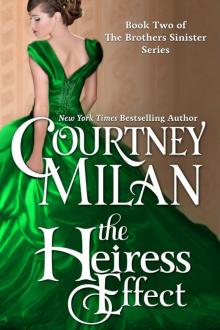 The Heiress Effect
The Heiress Effect Unraveled
Unraveled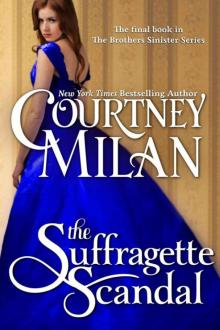 The Suffragette Scandal
The Suffragette Scandal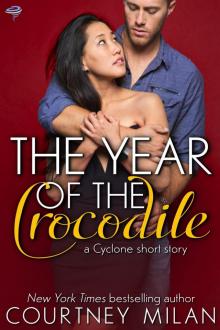 The Year of the Crocodile
The Year of the Crocodile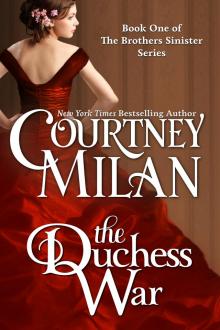 The Duchess War
The Duchess War What Happened at Midnight
What Happened at Midnight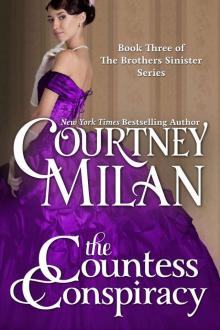 The Countess Conspiracy
The Countess Conspiracy Proof by Seduction
Proof by Seduction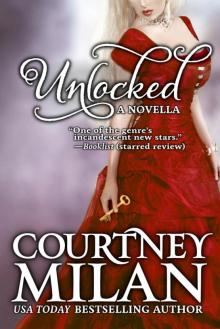 Unlocked
Unlocked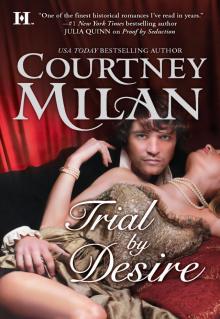 Trial by Desire
Trial by Desire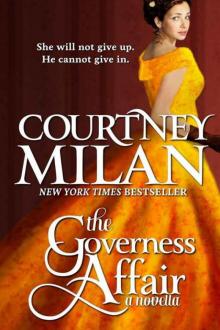 The Governess Affair
The Governess Affair Unveiled
Unveiled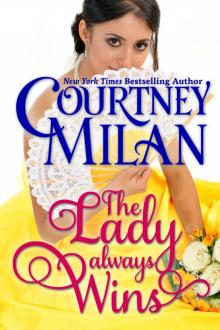 The Lady Always Wins
The Lady Always Wins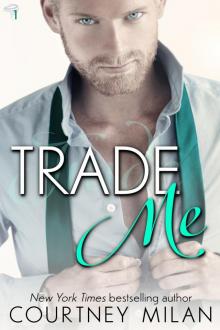 Trade Me
Trade Me Unclaimed
Unclaimed This Wicked Gift
This Wicked Gift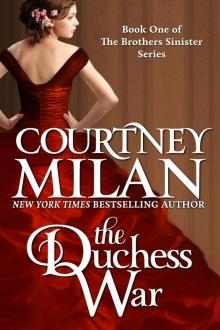 The Duchess War (The Brothers Sinister)
The Duchess War (The Brothers Sinister)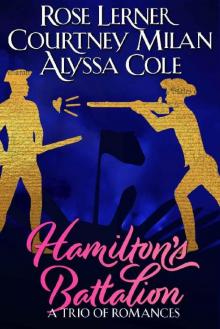 Hamilton's Battalion: A Trio of Romances
Hamilton's Battalion: A Trio of Romances The Turner Series
The Turner Series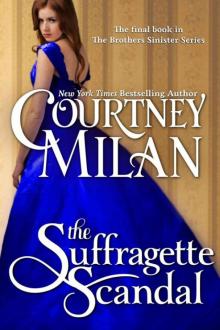 The Suffragette Scandal (The Brothers Sinister)
The Suffragette Scandal (The Brothers Sinister)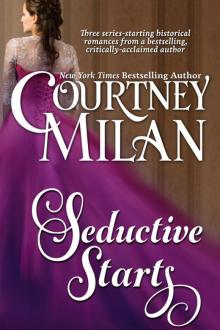 Seductive Starts
Seductive Starts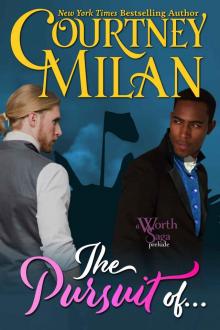 The Pursuit Of…
The Pursuit Of…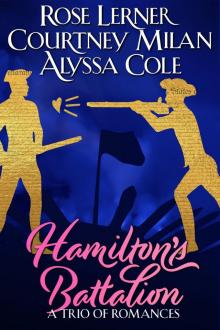 Hamilton's Battalion
Hamilton's Battalion The Carhart Series
The Carhart Series Seven Wicked Nights
Seven Wicked Nights This Wicked Gift (A Carhart Series Novella)
This Wicked Gift (A Carhart Series Novella)